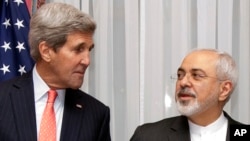Two years ago, diplomats from the United States and Iran began negotiating a nuclear deal. It was the first direct diplomacy between the two countries in more than 30 years.
The talks included all permanent members of the UN Security Council and Germany, but the two biggest players in the negotiations were U.S. Secretary of State John Kerry and Iran Foreign Minister Javad Zarif.
Both diplomats have been criticized at home, accused of dealing with the enemy. Both have expressed an enormous personal interest in making a deal, saying it would avert a war and help rescue Iran’s economy.
“I do not think you’re going to see any sudden economic benefits, but I do think you are going to see sustained and sustainable economic impact in a positive way for the Iranian economy,” said Reza Marashi, Research Director at the National Iranian American Council.
Elections changed landscape
In 2007, then-presidential candidate Barack Obama was criticized by opponents after saying he would talk to the leaders of countries with whom the U.S. has strong differences, including Iran.
“And the reason is this,” Obama said in the 2007 online debate. “That the notion that somehow not talking to countries is punishment to them … is ridiculous."
The 2013 election of Iranian President Hassan Rouhani, seen as more moderate than former Iranian leaders, helped kick-start the negotiations.
“These talks became possible because Iranian people went out in an election, voted for Hassan Rouhani as a president, defied all odds when there was a very hopeless situation,” said Iranian journalist Arash Azizi.
Analysts say the two nations are not suddenly friends, but will both benefit from a deal.
Agreement is just the beginning
Implementation of the accord, if approved, is expected to be a long and complex process.
“You are talking about nuclear science. You are talking about engineering,” Marashi said. “You are talking about a web of sanctions that frankly, when they were put into place, nobody was planning on undoing them. So, you have to reverse engineer steps in the nuclear realm, in the scientific realm and frankly the political realm as well.”
Now diplomats return to their respective homes to convince opponents of the agreement in both countries to not only accept the deal, but to accept an alternative world view that includes Iran and the United States working together.
Iran Deal the Result of Having Right Players in Place

VIENNA —




